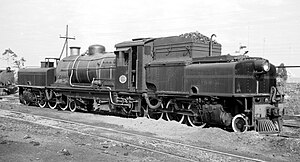South African Class GDA 2-6-2+2-6-2
| South African Class GDA 2-6-2+2-6-2 | |||||||||||||||||||||||||||||||||||||||||||||||||||||||||||||||||||||||||||||||||||||||||||||||||||||||||||
|---|---|---|---|---|---|---|---|---|---|---|---|---|---|---|---|---|---|---|---|---|---|---|---|---|---|---|---|---|---|---|---|---|---|---|---|---|---|---|---|---|---|---|---|---|---|---|---|---|---|---|---|---|---|---|---|---|---|---|---|---|---|---|---|---|---|---|---|---|---|---|---|---|---|---|---|---|---|---|---|---|---|---|---|---|---|---|---|---|---|---|---|---|---|---|---|---|---|---|---|---|---|---|---|---|---|---|---|
 No. 2255, Stanger Depot, 8 September 1966 | |||||||||||||||||||||||||||||||||||||||||||||||||||||||||||||||||||||||||||||||||||||||||||||||||||||||||||
| |||||||||||||||||||||||||||||||||||||||||||||||||||||||||||||||||||||||||||||||||||||||||||||||||||||||||||
| |||||||||||||||||||||||||||||||||||||||||||||||||||||||||||||||||||||||||||||||||||||||||||||||||||||||||||
| |||||||||||||||||||||||||||||||||||||||||||||||||||||||||||||||||||||||||||||||||||||||||||||||||||||||||||
| |||||||||||||||||||||||||||||||||||||||||||||||||||||||||||||||||||||||||||||||||||||||||||||||||||||||||||
The South African Railways Class GDA 2-6-2+2-6-2 of 1929 was an articulated steam locomotive.
In December 1929, the South African Railways placed five Class GDA Garratt articulated locomotives with a 2-6-2+2-6-2 Double Prairie type wheel arrangement in branch line service on the Natal North Coast line.[1][2][3]
Manufacturer[edit]
The Class GDA 2-6-2+2-6-2 Double Prairie type Garratt locomotive was built to the same specifications and was for all intents and purposes identical to the Class GD in its main dimensions. They were ordered from Linke-Hofmann Werke AG in Breslau, Germany in 1929 and numbered 2255 to 2259 upon delivery in December of that same year.[1][2][3][4][5]
Characteristics[edit]
The locomotive had the same tractive effort as the Class GD, was also superheated and also had Walschaerts valve gear to actuate its piston valves. The main differences were the use of bar frames instead of plate frames, differently shaped coal and water bunkers, and a round-topped firebox instead of a Belpaire firebox.[1][2][3][4][5][6]
Service[edit]
The five locomotives were placed in service working out of Cape Town where they were to join the Class GD on the Overberg branch across Sir Lowry's Pass to Caledon and Bredasdorp, but they were found to be not satisfactory in service and ended up being staged on a siding near the Cape Town sheds for a considerable time. When a question was raised in the local press, enquiring the reason why these brand new locomotives were not being used, they were first moved to a less conspicuous location and shortly afterwards transferred to Natal.[1]
The Natal shops managed to get the locomotives to perform satisfactorily and they were placed in branch line service on the North Coast line in Natal, working around Stanger. This line contains long gradients of 1 in 40 (2½%) and severe curvature with curves of 300 feet (91 metres) radius. Some locomotives later ended up working on the Port Alfred branch. In 1970 a pair was sent to Port Elizabeth where they worked local goods trains until they were all withdrawn by 1972.[1][2][3]
SAR locomotive policy[edit]
During the term of office of Colonel F.R. Collins DSO as SAR Chief Mechanical Engineer from 1922 to 1929 articulated locomotives were in great favour in South Africa, to the extent that the Railway Board of the day instructed that non-articulated engines should only be ordered in exceptional circumstances. His retirement in 1929 brought about a change in policy, however, and there would be an interval of nearly a decade before another articulated Cape gauge Garratt would be acquired.[7]
Preservation[edit]
Two locomotives were "preserved". No. 2257 was plinthed at Grahamstown Station. After the branch line via Grahamstown to Port Alfred fell into disuse, however, an apathetic local government allowed Grahamstown's historic station buildings and especially the plinthed locomotive to be vandalised to an eyesore state by 2013. Another engine, no. 2259, was staged at the South African National Railway And Steam Museum in Krugersdorp.
Illustration[edit]
-
No. 2257 in factory grey livery, c. 1929
-
No. 2259 on the Natal North Coast, May 1971
-
No. 2257 plinted at Grahamstown Station, c. 1991
References[edit]
- ^ a b c d e Holland, D. F. (1972). Steam Locomotives of the South African Railways. Vol. 2: 1910-1955 (1st ed.). Newton Abbott, England: David & Charles. pp. 61–62. ISBN 978-0-7153-5427-8.
- ^ a b c d Espitalier, T.J.; Day, W.A.J. (1946). The Locomotive in South Africa - A Brief History of Railway Development. Chapter VII - South African Railways (Continued). South African Railways and Harbours Magazine, February 1946. p. 134.
- ^ a b c d Paxton, Leith; Bourne, David (1985). Locomotives of the South African Railways (1st ed.). Cape Town: Struik. pp. 90–91. ISBN 0869772112.
- ^ a b South African Railways & Harbours/Suid Afrikaanse Spoorweë en Hawens (15 Aug 1941). Locomotive Diagram Book/Lokomotiefdiagramboek, 3'6" Gauge/Spoorwydte. SAR/SAS Mechanical Department/Werktuigkundige Dept. Drawing Office/Tekenkantoor, Pretoria. p. 31.
- ^ a b South African Railways & Harbours/Suid Afrikaanse Spoorweë en Hawens (15 Aug 1941). Locomotive Diagram Book/Lokomotiefdiagramboek, 2'0" & 3'6" Gauge/Spoorwydte, Steam Locomotives/Stoomlokomotiewe. SAR/SAS Mechanical Department/Werktuigkundige Dept. Drawing Office/Tekenkantoor, Pretoria. p. 31.
- ^ Hamilton, Gavin N., The Garratt Locomotive - Garratt Locomotives from Other Builders, retrieved 10 November 2012
- ^ Espitalier, T.J.; Day, W.A.J. (1946). The Locomotive in South Africa - A Brief History of Railway Development. Chapter VII - South African Railways (Continued). South African Railways and Harbours Magazine, January 1946. p. 13.



